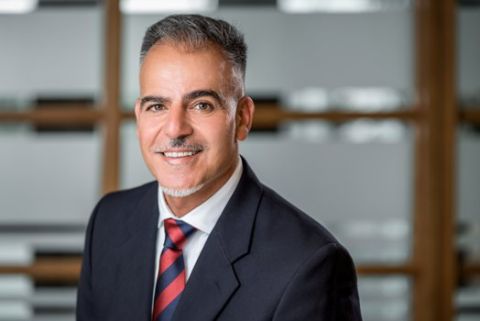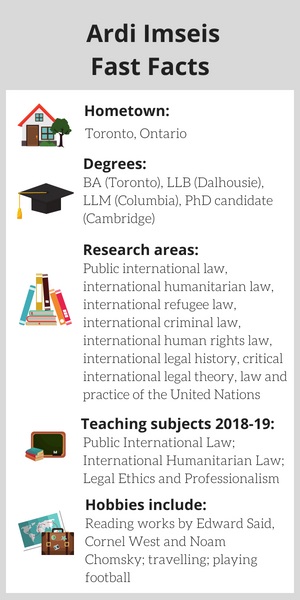
This Q&A is part of a series featuring faculty members joining Queen’s Law this summer. 2018 is a banner year for faculty hires, with the addition of seven new professors to the school’s roster of exceptional scholars. All of these new talented researchers have already earned international recognition in their fields.
Upon arriving in Kingston, Professor Ardi Imseis spoke with Queen’s Law Reports to share his professional and personal interests.
Why did you decide to join Queen’s Law?
For a public international law scholar/practitioner, Queen’s was an obvious choice given its demonstrated commitment to international legal education and practice. The international law programs offered at Queen’s are second to none in the country, highlighted by the “Castle” program, in which I have lectured and taught for a number of years.
Another big draw for me to Queen’s was the opportunity to work with and among faculty who have a range and breadth of research and practice interests both within and beyond my own, promising to create synergies, where new ideas and thinking can flourish.

What got you interested in your area of law?
As a student of international relations and history, my interests in public international law were a natural outgrowth of my training, cosmopolitan outlook and global worldview. In particular, my interest in post-colonial theory and the multifarious contemporary consequences of European imperialism piqued a further interest in the role of international law, both as a tool for the creation and maintenance of these phenomena, but also as a means and method of challenging them on their own terms. In an ideal world, international law and justice should coincide – but they often don’t. And it is at that fault-line that my interests in public international law reside, informed by 12 years of practice with the United Nations in some of the world’s most tumultuous regions.
Tell us about your research.
My present research critically examines the relationship between international law and United Nations action, using the question of Palestine – the longest running conflict on the UN’s agenda – as a case study. My research interrogates the received wisdom regarding the UN’s fealty to the international rule of law, in favour of what might more accurately be described as an international rule by law. It attempts to demonstrate that, through the actions of the UN, Palestine and its people have been committed to a state of what I call “international legal subalternity,” according to which the promise of justice through international law is repeatedly proffered under a cloak of political legitimacy furnished by the international community, but its realization interminably withheld.
What are you most proud of?
Together with my partner, I am most proud of my children. They constantly remind me that learning moments come in the most benign, everyday occurrences; and that there is no greater tragedy than to miss those occurrences and fail to seize those moments.
Any hobbies or interests?
When I’m not reading Edward Said, Cornel West or Noam Chomsky, I love to travel and play sports, most particularly football (favourite clubs: Barcelona FC, Celtic FC). My contrarian side is perhaps best demonstrated by the fact that, despite being from Toronto, I’m a life-long Montreal Canadiens fan.